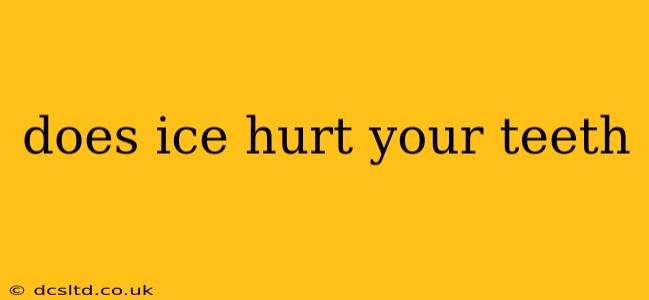Many of us enjoy a refreshing ice cube on a hot day, but have you ever wondered if this seemingly harmless act could be damaging your teeth? The short answer is: it can, depending on several factors. While the occasional ice cube probably won't cause significant harm, frequently consuming ice or exposing your teeth to extreme cold can lead to several dental problems. This article will delve into the reasons why and offer advice on how to protect your pearly whites.
What Happens When You Bite on Ice?
When you bite down on ice, you're subjecting your tooth enamel – the hard outer layer protecting your teeth – to extreme temperature changes and significant force. This can lead to several issues:
-
Fractured or Cracked Teeth: Ice is surprisingly hard, and the force of biting can cause cracks or fractures in your teeth, especially if you have pre-existing weaknesses or fillings. These cracks can be microscopic and initially painless, but they can worsen over time, leading to sensitivity, pain, and ultimately, the need for extensive dental work.
-
Tooth Sensitivity: The sudden temperature change can trigger the nerves within your teeth, leading to increased sensitivity to hot and cold. This is particularly true if you already experience sensitivity. Repeated exposure to ice can exacerbate this sensitivity.
-
Enamel Erosion: While less common than fracturing, repeated exposure to extreme cold can contribute to enamel erosion over time. This weakens the enamel, making your teeth more susceptible to cavities and other dental problems.
Can Ice Cause Tooth Sensitivity?
Yes, ice can absolutely cause or worsen tooth sensitivity. The sudden drop in temperature shocks the nerves in your teeth, causing a sharp, shooting pain. This is often temporary, but repeated exposure can lead to more persistent sensitivity. Those with existing enamel wear or exposed dentin are particularly vulnerable.
Is It Okay to Occasionally Chew Ice?
Occasional ice chewing is unlikely to cause significant damage for most people. However, making it a habit is strongly discouraged. Think of it like this: a single scratch on your car doesn't cause immediate damage, but repeatedly scratching it will eventually lead to significant problems.
How Can I Protect My Teeth from Ice?
If you enjoy the occasional refreshing bite of ice, consider these precautions:
-
Limit your intake: Avoid chewing ice excessively. A single small ice cube now and then is far less harmful than consistently chewing large amounts.
-
Choose smaller pieces: Instead of large chunks, opt for smaller ice chips or crushed ice, which require less force to chew.
-
Stay hydrated: Drinking plenty of water helps to neutralize the effects of acidity in your mouth, which may occur due to temperature changes.
-
Regular dental checkups: Regular visits to your dentist can help identify any early signs of damage or sensitivity, allowing for timely intervention.
How Do I Know If My Teeth Are Damaged From Ice?
If you experience any of the following, it's crucial to schedule a visit with your dentist:
- Sharp pain when chewing or biting down
- Increased tooth sensitivity
- Visible cracks or chips in your teeth
- Discoloration of your teeth
Protecting your teeth from the potential harm of ice is simple. By following these tips, you can enjoy a refreshing cool-down without jeopardizing your dental health. Remember, moderation is key! If you have concerns, always consult your dentist.
